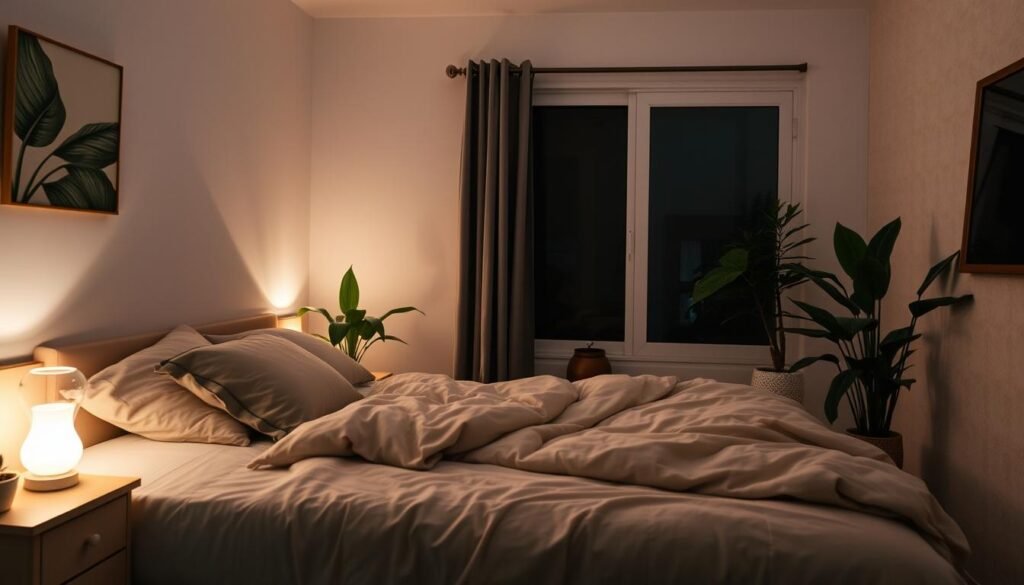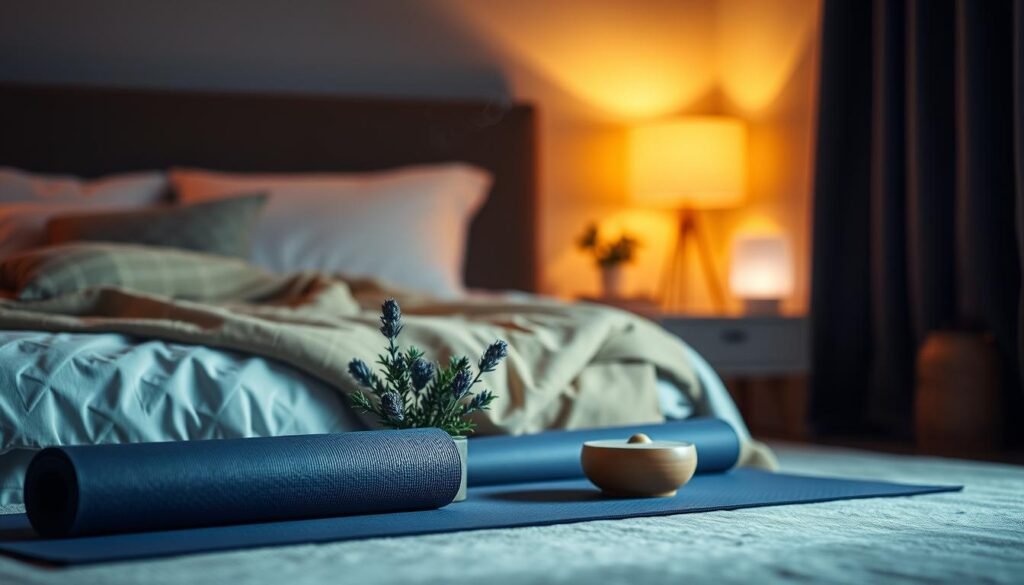Did you know nearly 67% of people struggle with bad sleep for a long time? This can lead to serious health issues like heart problems and being overweight. Adults should sleep at least seven hours to stay healthy. In our busy world, it might seem hard to get good sleep. But, by following some expert advice and knowing what affects sleep, you can turn your home into a sleep-friendly zone. This piece will cover top tips for better sleep at home. We’ll talk about improving your sleep habits, making your bedroom better for sleep, eating right, and dealing with sleep problems. All these points are key to getting the deep sleep we all want.
Key Takeaways
- The ideal sleep duration for adults is at least seven hours.
- Stress management, such as meditation, can enhance sleep quality.
- Creating a cool, dark, and quiet bedroom environment is crucial for restful sleep.
- Avoiding screens and bright lights before bed can improve sleep onset.
- Recognizing and addressing sleep disorders is vital for long-term health.
- Engaging in physical activity positively affects sleep but should be timed appropriately.
The Importance of Quality Sleep
Quality sleep is key to good health and happiness. It affects our physical and mental state deeply. When we get enough good sleep, we think better, feel happier, and stay healthier.
Understanding Sleep’s Impact on Health
Not sleeping enough can lead to serious health issues. These include heart disease, diabetes, and even obesity. Sleep loss hurts our ability to make decisions and think clearly. It’s vital to know about our sleep habits to avoid long-term problems.
Consequences of Poor Sleep
Poor sleep has many negative effects. It can make us feel irritable, anxious, and depressed. Trouble getting to sleep and waking up often are signs of bad sleep hygiene. Making good sleep routines and spaces is key.
Best Practices for Improving Sleep at Home
To improve sleep quality, some habits truly help. Consistent sleep schedules are key for our bodies’ internal clocks. They help us rest better. Good sleep hygiene is also vital, getting your mind and body ready for the night.
Establishing a Consistent Sleep Schedule
Keeping the same bedtime and wake-up time every day is important. This habit makes our bodies adapt and sleep better. Aim for 7 to 9 hours of sleep for best results. If sticking to a schedule is hard, try using alarms as reminders.
Recognizing the Role of Sleep Hygiene
Sleep hygiene involves habits that lead to better sleep. Some key strategies are:
- Limiting screen time at least an hour before sleep to cut down blue light exposure.
- Creating a calming routine before bed, like reading or meditation.
- Making sure your bedroom is comfy, quiet, and dark.
- Not consuming caffeine six hours before sleeping to avoid disturbances.
By adopting these practices, you can make your home a better place for restful sleep.
Creating an Optimal Bedroom Environment
To get good sleep, the right bedroom setup is key. You’ll sleep better if the room has the right temperature, light, and noise level. Having comfy furniture and bedding helps your well-being too.
Temperature, Light, and Noise Control
Keep your bedroom at 65 degrees Fahrenheit for the best sleep. Cool rooms are more comfortable for sleeping. Block out light with dark curtains to avoid waking up at night.
Reducing noise is also important for quality sleep. White noise machines or earplugs can help. Too much noise can hurt your sleep and mental health.
Furniture and Bedding Choices
Choosing the right mattress and bedding can help you sleep well. A medium-firm mattress is often best, especially for easing back pain. Replace your mattress every seven years to keep it comfy.
Choose bedding made of cotton or bamboo if you get hot at night. These fabrics breathe better than synthetics. Wash your sheets every two weeks to keep dust mites away.
Adding scents like lavender can make your bedroom more relaxing. Comfy furniture also makes a big difference. For more tips on getting a good night’s sleep, check out this resource on natural sleep aids.

Incorporating Relaxation Techniques
Effective relaxation techniques can greatly enhance sleep quality. They soothe the mind and body, leading to peaceful nights. Including mindfulness and meditation in routines adds to a calm atmosphere, vital for good sleep.
Mindfulness and Meditation Practices
Mindfulness and meditation are key in handling stress and anxiety. Using diaphragmatic breathing and progressive muscle relaxation triggers relaxation. People benefit from deep breathing techniques, such as the 4-7-8 method, to regulate breath before sleep.
Mental imagery through visualization exercises can also cut down stress, improving sleep. Regular mindfulness activities bring attention to the present, easing the way into sleep.
Gentle Activity and Stretching Before Bed
Gentle activities are crucial for a restful night. Stretching releases muscle tension, aiding in relaxation. Yoga nidra and body scans are good for a mental and physical unwind.
Low-impact exercises calm the nervous system, bettering sleep. A routine of relaxation practices, like breathing and stretching for 20-25 minutes, greatly reduces stress. Such consistency not only improves sleep but also boosts overall health.

| Relaxation Technique | Benefits | Frequency Recommended |
|---|---|---|
| Diaphragmatic Breathing | Calms the mind, reduces anxiety | Daily for 10-15 minutes |
| Progressive Muscle Relaxation | Eases muscle tension, promotes relaxation | Daily or as needed |
| Yoga Nidra | Induces deep relaxation, aids sleep quality | Several times a week |
| Gentle Stretching | Relieves physical tension, prepares for sleep | Every night before bed |
| Visualization Exercises | Reduces stress, calms the body | Before sleep, as needed |
Managing Your Diet for Better Sleep
The link between what we eat and how we sleep is strong. What you eat before bed can impact how well you sleep. Choosing the right foods supports a good night’s rest.
Foods to Avoid Before Bedtime
Some foods can make it hard to sleep and should be avoided before bed. Here are the main foods to steer clear of:
- Caffeinated beverages: Drinks like coffee and tea can keep your mind buzzing into the night.
- Alcohol: It might seem relaxing at first, but can actually disturb your sleep later on.
- Spicy or fatty foods: These can upset your stomach, making it tough to sleep comfortably.
- High-sugar snacks: They can cause your blood sugar to fluctuate, affecting your sleep quality.
Healthy Snack Options
On the other hand, eating healthy snacks before bed can help with sleep. Adding nutritious foods to your night-time routine is good for both sleep and overall health. Here are some snacks to consider:
- Almonds: They’re full of magnesium, which helps your muscles relax.
- Kiwi: Studies show kiwis may improve sleep quality.
- Tart cherries: They contain melatonin, which helps control your sleep cycle.
- Oatmeal: Its fiber can make you feel full and sleep better.

Eating a diet rich in fiber and nutrients can lead to better sleep. By focusing on the right foods and avoiding the bad ones, you can enhance your rest and recovery.
Understanding Your Circadian Rhythm
Your circadian rhythm is key to your daily physical, mental, and behavioral changes. It guides your sleep and wake times, mostly thanks to light exposure. By tuning into this natural cycle, you can improve how well you sleep.
Regulating Light Exposure
Keeping a check on light exposure is crucial for a healthy circadian rhythm. You should soak in bright light in the morning. Doing so resets your body clock and keeps you sharp all day. Here are some ways to achieve this:
- Get outside and enjoy natural sunlight for at least 30 minutes after you wake up.
- Stay away from screens and their blue light at least an hour before going to bed.
- Turn down lights in the evening to tell your body it’s bedtime.
Adapting Your Routine to Your Natural Cycle
To sleep better, align your routine with your body’s natural rhythms. Try these steps:
- Have your meals at the same time every day to manage hunger and sleepiness.
- Get up at the same time every day, even on weekends, to stabilize your sleep schedule.
- Be active daily, preferably outside, to support your natural rhythm.
Daytime brightness coupled with less light at night makes for perfect sleeping conditions.
| Practice | Impact on Circadian Rhythm |
|---|---|
| Morning sunlight exposure | Helps reset the body clock, promoting alertness |
| Avoiding screens before bed | Enhances melatonin production for better sleep onset |
| Consistent meal times | Calibrates biological clock, improving overall sleep quality |
| Regular exercise | Supports healthy sleep patterns and maintains a balanced circadian rhythm |
The Role of Physical Activity in Sleep Quality
Making physical activity a regular part of your day can greatly improve your sleep. Studies show that exercise helps you fall asleep quicker and sleep better. It’s also important to know when to exercise for the best sleep benefits.
Choosing the right time for exercise can greatly impact your sleep quality. This knowledge helps in planning your daily activities.
Best Times to Exercise for Sleep Benefits
Activities like moderate-intensity aerobic exercises are good for sleep. Working out in the morning or early afternoon is best. If you exercise for 30 minutes daily, you might sleep an extra 15 minutes.
Exercise and better sleep go hand in hand, but avoid intense workouts right before bed. They can make you too alert to fall asleep. Try to finish exercising 1 to 2 hours before bedtime. Morning exercise, even if it’s light, can also increase your sleep time.
Activities That Promote Better Sleep
Adding certain exercises to your routine can improve your sleep. Good exercises for sleep include:
- Moderate aerobic exercise (e.g., brisk walking, cycling)
- Gentle yoga
- Stretching routines
- Swimming
These activities can help calm your mood, relieve stress, and help you sleep better. To learn more about how exercise affects sleep, check out this resource.
Recognizing Sleep Disorders and Their Impact
Understanding sleep disorders is crucial for those struggling with rest. It helps manage sleep better and boost health. Around one-third of adults show signs of insomnia. It is essential to spot these issues, especially if they stick around.
Common Sleep Disorders Explained
Sleep disorders show up in many ways and touch on several parts of life. Insomnia means some find it hard to fall or stay asleep due to stress or lifestyle. Indeed, 4 to 22% of people have severe enough insomnia symptoms to require clinical attention. Besides insomnia, other common sleep issues are:
- Sleep apnea: Temporary stops in breathing during sleep that cause too much daytime tiredness.
- Restless legs syndrome: This causes a need to move the legs when resting, making it hard to sleep.
- Narcolepsy: This leads to being overly sleepy during the day and possibly falling asleep suddenly.
- Parasomnias: These are unwanted actions or movements during sleep, like sleepwalking or having nightmares.
- Circadian rhythm sleep disorders: These mess with the body’s internal clock, breaking sleep patterns and causing sleepiness in the day.
These disorders can badly affect mental and physical health, leading to moodiness, memory issues, and less sharp performance. For instance, not dealing with sleep disorders could lead to gaining weight and more car accidents. This shows how important it is to tackle these problems.
When to Seek Professional Help
If you are often sleepy during the day, easily irritated, find it hard to focus, or need many naps, you might need help. Writing down sleep habits can show patterns useful when talking to doctors.
Some may find better daily routines, improving sleep spaces, or doing relaxing things before bed can help. If these steps don’t work, seeing a medical expert for advice is key. With over 50 million Americans dealing with chronic sleep issues, finding the right help is vital for recovery.
| Type of Disorder | Symptoms | Impact on Life |
|---|---|---|
| Insomnia | Difficulty falling/staying asleep | Fatigue, irritability |
| Sleep Apnea | Breathing interruptions | Daytime exhaustion, decreased productivity |
| Restless Legs Syndrome | Urgency to move legs | Disrupted sleep, daytime sleepiness |
| Narcolepsy | Excessive daytime sleepiness | Sudden sleep attacks, impaired daily function |
| Parasomnias | Sleepwalking, nightmares | Disturbed sleep, anxiety about sleep |
Conclusion
Improving sleep involves many steps like setting good sleep habits and making the bedroom better for sleep. It also means knowing when to get help. Strategies like sleeping at the same time every night and learning about sleep hygiene are key. They help you sleep deeply and boost your health.
Making your bedroom perfect for sleep is very important. Keep the temperature near 60 degrees and cut down on unwanted light and noise. Doing calming activities before bed, like a warm bath or mindfulness, can also make a big difference.
These suggestions offer a full plan to fight bad sleep, which is important because not sleeping well can hurt your mood and health. For more tips on sleep, check out this detailed summary of sleep tips. By taking small steps, you can improve your sleep and feel better overall.